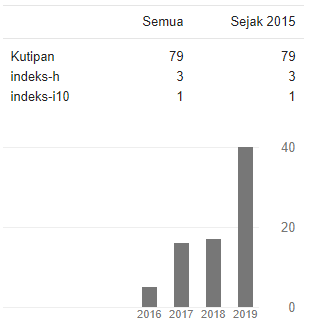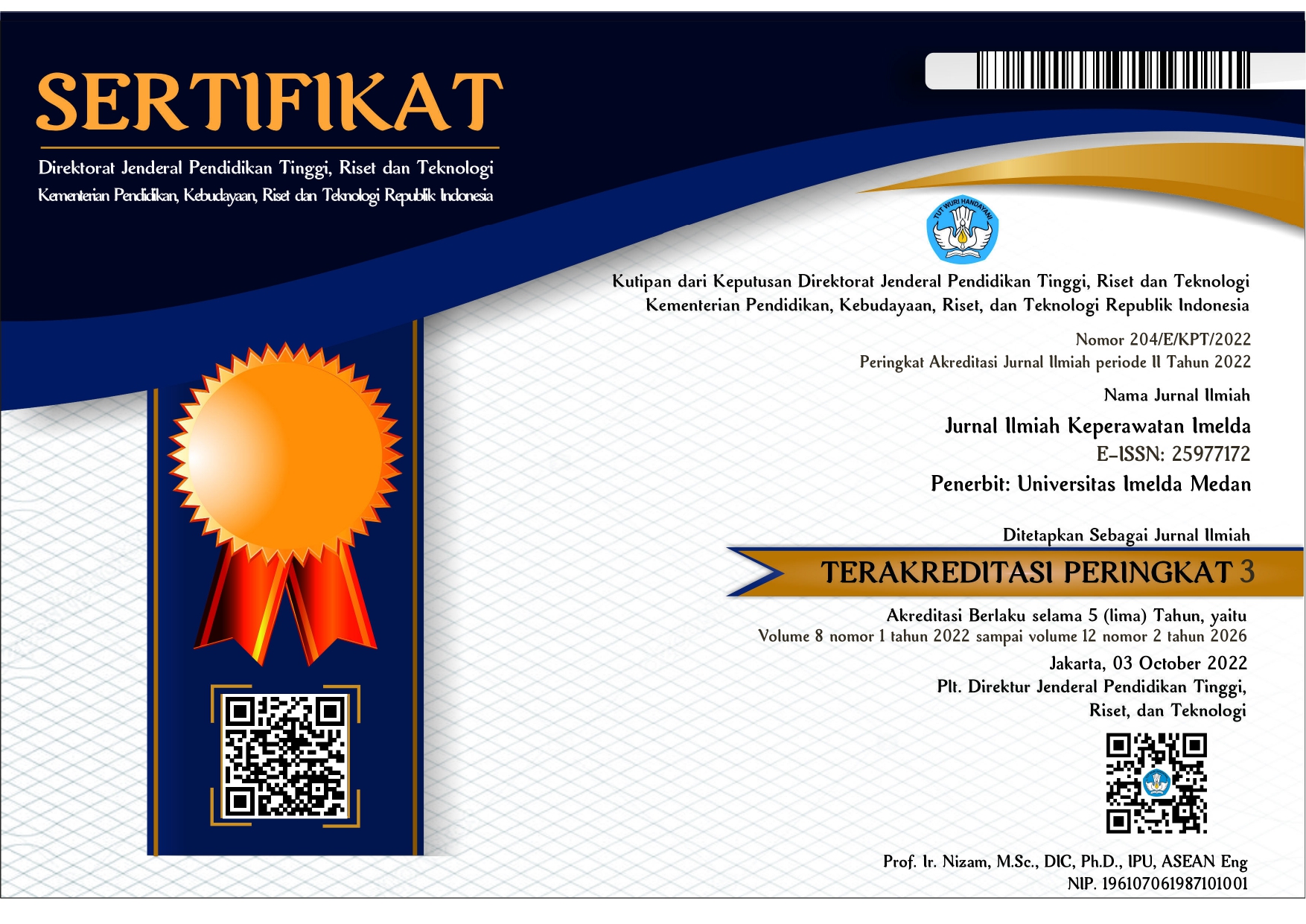PENGARUH SENAM OTAK DALAM MENINGKATKAN FUNGSI KOGNITIF DAN KESIAGAAN MENGHADAPI GANGGUAN KONSENTRASI PADA ANAK USIA 4-5 TAHUN DI TK NEGERI PEMBINA SIDIKALANG
DOI:
https://doi.org/10.52943/jikeperawatan.v10i2.1747Keywords:
Brain Exercise, Cognitive Function, ChildrenAbstract
ABSTRACT
Education for early childhood is an effort to provide and provide guidance to help the physical and spiritual growth and development of children from birth to 6 years of age so that they are ready to enter the next stage of education. The quality of a child's future development is largely determined by the stimulation they receive from an early age. Providing educational stimulation is very important, because 80% of brain growth develops at an early age. Brain exercises are used as a method to improve cognitive abilities or memory and concentration in children. This research aims to determine the effect of brain exercises in improving cognitive function and preparedness to deal with concentration disorders in students at Pembina Kindergarten, Dairi Regency. The study design in this research is quasi experimental with one group pre test and post test design. Determining the sample for this study used the G-Power application version 3.1.9.7 with T-test, one tail, effect size 0.85, alpha error 0.05, and power 0.80, so a minimum of 16 plus a possibility of error of 10% are needed, so the respondents needed in this study totaling 18 respondents. Brain exercise is carried out 3 (three) times a week for a week and evaluation is carried out on the seventh day. The results of this study used bivariate analysis, namely the Wilcoxon statistical test to identify cognitive function and preparedness for facing concentration problems before and after brain exercise. The results of this study show that there are differences in cognitive function and preparedness for concentration disorders between before and after brain exercise with a P value of 0.002 and a P value of 0.001. This shows that there is a statistically significant difference in cognitive function and preparedness for dealing with concentration problems before and after being given the intervention with a P value <0.05. Conclusion: Brain exercise training has an effect on cognitive function and preparedness for facing concentration problems in children 4-5 years old in Kindergarten Pembina, Dairi Regency.
Downloads
References
Asmawati, L. (2022). Peran Orang Tua dalam Pemanfaatan Teknologi Digital pada Anak Usia Dini. Jurnal Obsesi: Jurnal Pendidikan Anak Usia Dini, 6(1), 30–44. https://doi.org/10.31004/obsesi.v6i1.1170
Awantari, Q., Astini, B. N., Habibi, M., & Nurhasanah. (2023). Pengaruh Senam Otak Terhadap Perkembangan Kognitif Pada Kelompok B di TK Tunas Bangsa Tahun Ajaran 2022/2023. Jurnal Ilmiah Profesi Pendidikan, 8(4), 2050–2057. https://doi.org/10.29303/jipp.v8i4.1671
Dami, Z. A. (2019). Pedagogi Shalom: Analisis Kritis Terhadap Pedagogi Kritis Henry A. Giroux dan Relevansinya Bagi Pendidikan Kristen di Indonesia. Jurnal Filsafat, 29(1). https://doi.org/10.22146/jf.42315
Dami, Z. A., & Curniati, S. (2018). Pola Asuh Autoritatif dan Jenis Kelamin sebagai Prediktor Big Five Personality Factors: Implikasinya Bagi Pelayanan Bimbingan dan Konseling. Jurnal Kajian Bimbingan Dan Konseling, 3(4), 182–196. https://doi.org/https://doi.org/10.17977/um001v3i42018p182
Dami, Z. A., & Parikaes, P. (2018). Regulasi Diri Dalam Belajar Sebagai Konsekuen. Ciencias: Jurnal Penelitian Dan Pengembangan Pendidikan, 1(1), 82–95. https://ejournal.upg45ntt.ac.id/ciencias/article/view/19
Dennison, P. E. (2008). Brain Gym Dan Aku: Merasakan Kembali Kenikmatan Belajar. Jakarta: Grasindo.
Dhiu, K. D., Laksana, D. N. L., Dopo, F., Ita, E., Natal, Y. R., Jau, M. Y., Ngonu, M. R., Kembo, M. R., Deghe, M., Wunu, B., & Tawa, O. P. A. (2021). Aspek Perkembangan Anak Usia Dini. Jawa Tengah: Nasya Expanding Management.
Furi, A. Z., & Harmawati. (2019). Meningkatkan Kemampuan Kognitif melalui Penerapan Metode Eksperimen Menggunakan Media Loose Parts pada Anak Kelompok B. Emphaty Cons: Journal of Guidance and Counseling, 1(2), 7–19. https://doi.org/https://doi.org/10.31331/emp.v2i1.kodeartikel
Handayani. (2020). Metode Penelitian Kualitatif & Kuantitatif. Pustaka Ilmu.
Khadijah. (2016). Pengembangan Kognitif Anak Usia Dini. Medan: Perdana publising.
Khoiriyati, S., & Saripah. (2018). Pengaruh Media Sosial pada Perkembangan Kecerdasan Kognitif Anak Usia Dini. Aulada : Jurnal Pendidikan Dan Perkembangan Anak, 1(1), 49–60. https://doi.org/https://doi.org/10.31538/aulada.v1i1.209
Kristina, & Ernawati, N. (2015). Pengaruh Senam Otak Terhadap Tingkat Konsentrasi Belajar Mahasiswa. Jurnal Kesehatan Hesti Wira Sakti, 3(3), 69–74. https://jurnal.poltekkes-soepraoen.ac.id/index.php/HWS/article/view/99
Lutfiana, F., Kusumastuti, N., & Sukmono, N. D. (2022). Pembiasaan Senam Otak Untuk Meningkatkan Konsentrasi Pada Anak Adhd Tk Beranda Istimewa Kabupaten Ngawi. Pedagogi : Jurnal Anak Usia Dini Dan Pendidikan Anak Usia Dini, 8(2), 167–176. https://doi.org/https://doi.org/10.30651/pedagogi.v8i2.12945
Maemunah, N., Metrikayanto, W. D., & Helly, C. (2021). Pemberian Edukasi Melalui Animasi Tentang TB (Tuberculosisi) Paru Terhadap Pengetahuan Anak Sekolah Dasar Negeri Merjosari 02 Kota Malang. Jurnal Kesehatan Mesencephalon, 7(1), 46–55. https://doi.org/http://dx.doi.org/10.36053/mesencephalon.v7i1.245
Nursalam. (2015). Metodologi Ilmu Keperawatan (Edisi Empa). Jakarta: Salemba Medika.
Nurwidita, D. (2021). Validitas Prediktif Army Alpha I terhadap Kesuksesan Pelatihan Siswa Training [Universitas Gadjah Mada]. https://etd.repository.ugm.ac.id/home/detail_pencarian_downloadfiles/621336
Prasanti, F. D. (2015). Pengaruh Brain Gym terhadap Konsentrasi Belajar pada Siswa Kelas VIII SMP Negeri 16 Surakarta Tahun Ajaran 2014/2015 [Universitas Sebelas Maret]. https://digilib.uns.ac.id/dokumen/detail/44820/
Pujiastuti, N., Handoko, L., Gustirini, R., Indriani, R., & Sugiyatmi, T. A. (2024). Pendidikan Kesehatan Pada Anak Tentang Senam Otak Untuk Meningkatkan Konsentrasi Belajar. Jurnal Masyarakat Mandiri, 8(2), 2285–2292. https://doi.org/DOI: https://doi.org/10.31764/jmm.v8i2.22313
Rumengan, L. S. (2017). Senam Otak Untuk Meningkatkan Konsentrasi Pada Murid TK. Universitas Katolik Soegijapranata Semarang.
Suratun, & Tirtyanti, S. (2020). Pengaruh Brain Gym Terhadap Konsentrasi Belajar Siswa. Jurnal Keperawatan Muhammadiyah, 5(1), 101–105. https://journal.um-surabaya.ac.id/JKM/article/view/3625/2730
Surya, T. (2019). Efektivitas Senam Otak (Brain Gym) Dalam Menurunkan Tingkat Kejenuhan (Burnout) Pada Siswa Dalam Pelajaran Sejarah Kebudayaan Islam Dan Aqidah Akhlak Di Mts Yapi Sleman Yogyakarta [Universitas Islam Indonesia. https://dspace.uii.ac.id/handle/123456789/14297
Susanto, R. (2017). Keterampilan Manajemen Kelas Melalui Gerakan Sederhana Senam Otak (Brain Gym) Di SD Pelita 2, Jakarta Barat. Jurnal Pengabdian Masyarakat AbdiMas, 3(2), 1–13. https://doi.org/https://doi.org/10.47007/abd.v3i2.1740
Wiradnyana, I. G. A., & Surasena, I. K. A. (2019). PEngaruh Aktivitas Senam Otak (Brain Gym) Untuk Meningkatkan Kognitif PAUD. Widyacarya: Jurnal Pendidikan, Agama Dan Budaya, 3(2), 65–71. https://doi.org/https://doi.org/10.55115/widyacarya.v3i2.335








